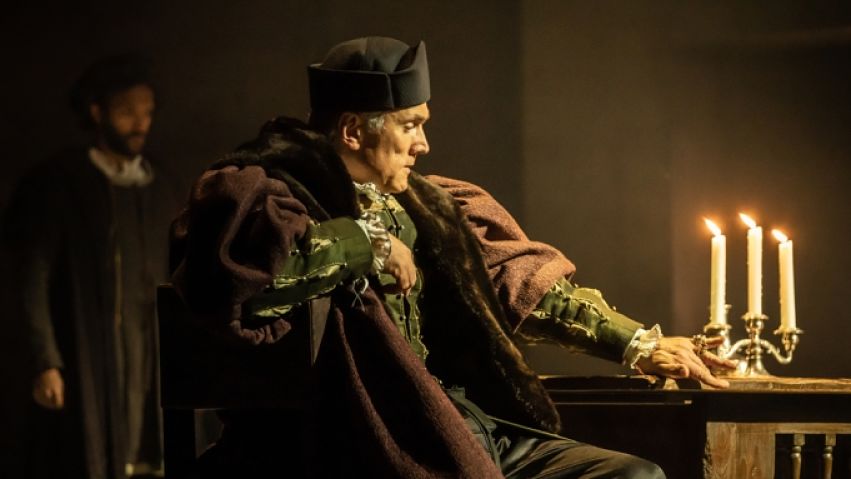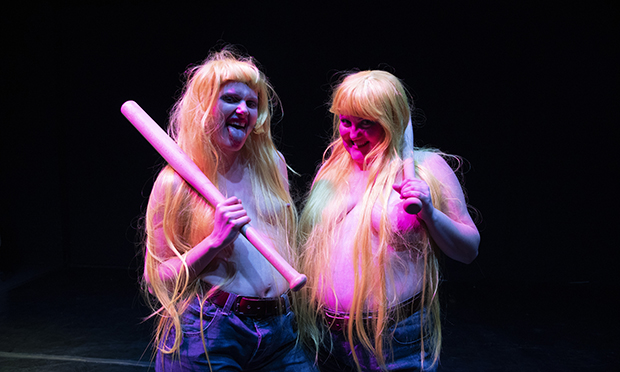The day after I returned from a theatre trip to London—seeing eight shows in six days without getting infected (more on that below)—a colleague asked what was the best thing I saw. My mind went blank. There were vibrant actors and eye-filling spectacles, new plays and revivals. But the best?
It was then I realized that the most exciting U.K. theatre is already here in New York. Six, The Lehman Trilogy, Caroline, or Change, and Company are all on Broadway at the moment, all of them outstanding productions that originated across the pond. And all left stronger impressions on me than the motley bag of Shakespeare, performance art, kids’ fantasy, historical soap opera, and literary parody I’d seen in the Big Smoke. London theatre is getting back on its feet like the rest of us, its subsidized companies and well-informed audiences still the envy of the world, but I did walk away questioning the robustness of the present scene—or at the least my curatorial choices.
For example, said colleague asked if I caught “the shark play.” Alas, no, I skipped The Shark Is Broken, the one property that could conceivably transfer to America. It’s a Jaws-based 90-minute three-hander, minus the animatronic killer fish of the title. The play was written by and stars Ian Shaw, son of the legendary Robert Shaw, who played the salty seaman Quint in the iconic Spielberg movie. In retrospect, I’m sorry to have missed what might be a fun little riff on movies and manhood, even if British actors playing Americans can often lead me to teeth grinding.
My molars suffered little bone loss during the National Theatre’s satisfying account of Larry Kramer’s The Normal Heart (which closed Nov. 6). A vibrant ensemble, led by the charming, swaggering Ben Daniels as irascible activist Ned Weeks, did justice to this evergreen drama about the desperate early days of the AIDS epidemic. Expertly directed by Dominic Cooke on an austere stage with a ceremonial flame raised high, this was Kramer as Greek tragedy: multiple Antigones—Ned, frontline doctor Emma Brookner (Liz Carr), and others—faced down a host of bureaucratic Creons. Ensemble members announced scene locations in their native accents, then launched into dialogue “in American.” The simple, presentational device acknowledged the artifice of the event while embracing the baseline realism of the play.
What is not artificial, of course, is the pandemic currently still threatening players and spectators. The character of Weeks is demonized and marginalized because he insists that gay men must be responsible for sexual choices leading to HIV infection. His unwavering stance: “It’s not a civil rights issue, it’s a contagion issue.” That motto rang loud and clear from the Olivier stage, as one looked around the auditorium and saw roughly half the audience blithely unmasked.
Ah, yes, masks. Fellow American theatre critics have already bemoaned London’s lax mask compliance, and my experience was no different. At the National, the Almeida Theatre, and the Donmar Warehouse, no one checked vaccination status, and there was zero enforcement of mask wearing. At three West End venues I visited, they did check vax status, but again, masking in the stalls was perhaps 50 percent. Conclusion? It’s hard to say. I’ve seen no reports of London theatres being superspreader zones, and I emerged unscathed. After a few days, I even started to wonder: Is my mask-wearing impolite? Such topsy-turvy thinking will clearly not end the health crisis, but many Londoners obviously believe vaccination is enough. Or is it simply that the English, long inured to discomfort by bad dentistry, spotty plumbing, perpetual damp weather, and greasy cuisine, draw the line at a KN95? (This week, in response to rising COVID infections in London, a number of companies, including the National, the Old Vic, the Royal Shakespeare Company, and the English National Opera, announced that face covering would be mandatory.)

Perhaps a history lesson was in order. The impetus for my trip was The Mirror and the Light, the stage adaptation of the final novel in Hilary Mantel’s trilogy about 16th-century king whisperer Thomas Cromwell. A chief architect of Henry VIII’s break from the Catholic Church and the downfall of Anne Boleyn, Cromwell has been rehabilitated in Mantel’s fiction as a forward-thinking Renaissance humanist hero. Stage versions of the first two novels, Wolf Hall and Bring Up the Bodies, were produced by the RSC and played on Broadway in 2015. The earlier adaptation were co-authored by Mantel and Mike Poulton, while The Mirror and the Light is credited to Mantel and Ben Miles, who stars as Cromwell. The elegant, square-jawed actor resembles his bulldoggish historical character not a whit; you might as well cast George Clooney as Henry Kissinger. Still, he’s dashing and resolute.
All the same, I’m sorry to report that Mirror is the weakest of the three RSC adaptations. While there are plenty of juicy, fast-paced scenes of Cromwell juggling the wife-hungry Henry (Nathaniel Parker), wily French ambassadors, and backbiting Privy Council lords, Mirror plays more like soap than history play of substance. Ticket buyers, it seems, felt the same way; the production announced an extension into January, then retracted it to post a Nov. 28 closing notice, blaming COVID. Mantel is a brilliant prose writer, but apparently cannot generate an equivalent stage poetry to connect past to present, individual to nation.
For that we must turn to Shakespeare, who never let the historical record or plot elements get in the way of vaulting, soul-stirring rhetoric. The Almeida presented The Tragedy of Macbeth (closed Nov. 27), starring James McArdle as the regicidal Scot and film star Saoirse Ronan as Lady Macbeth. Directed with a boldly feminist hand by Yaël Farber (who brought a memorable Hamlet to St. Ann’s Warehouse last year), this production offered contemporary industrial grit (a water faucet for washing off blood, heaps of soldier boots) and pagan creepiness (coronation ceremony with goat skull and drums). Noticeably, Farber explored Lady M’s humanity and guilt, placing her at the horrific murder of Lady Macduff and her children and futilely attempting to warn her fellow mother. And Farber directs intimate scenes between the Macbeths with a patient sympathy that gives their marriage unexpected poignance.
But, partly due to demands of the text, partly due to Ronan’s bland, shallow performance, the interpretation never went deeper than a provocative reading. Ronan provided a poised, luminous surface, but her stage acting is as yet too underdeveloped, too tentative. She reflects light well and speaks prettily. A revelatory Lady Macbeth needs to get her hands dirty.
Top prize for messiness and gleeful vulgarity goes to the performance group In Bed With My Brother. A queer performance trio comprised of Dora Lynn, Kat Cory, and Nora Alexander, the group mounted Prime_Time (at the Barbican, closed Nov. 6), an installation/protest against the megalomaniacal excesses of Amazon founder and amateur spaceman Jeff Bezos. Lynn and Cory, naked to the waist and wearing mom jeans and ratty yellow wigs, fantasized about castrating Bezos, practicing their violence on melons and lemons with power tools and baseball bats. For NYC avant-garde fans: Imagine if Half Straddle and Radiohole collaborated on a satirical one-off.

Turning to new English playwriting, I was keen to catch Love and Other Acts of Violence at the Donmar (closed Nov. 27), The Ocean at the End of the Lane (ongoing), an NT production in the West End, and an early preview of Little Scratch (through Dec. 11) at the Hampstead Theatre. The first is an original play by Cordelia Lynn about a contemporary love affair between a physicist (Abigail Weinstock) and a poet (Tom Mothersdale), corroded by a long, tragic history of antisemitism. Vividly acted but confused, it felt like a version of Nick Payne’s Constellations crossed with a period piece about Polish WWII atrocities.
Ocean is an adaptation (by Joel Horwood) of the 2013 Neil Gaiman young adult book about troubled kids and dangerous magic in the country. If you don’t mind 20-ish British actors playing teens, Katy Rudd’s production has plenty of puppetry and smoke-and-mirror eye candy. For anyone who’s dreamt of splicing together their favorite bits from The Curious Incident of the Dog in the Night-Time, War Horse, and Harry Potter and the Cursed Child, this could be your jam.
As a longtime admirer of director Katie Mitchell, I had to see Little Scratch. Based on the recent novel by Rebecca Watson, adapted by Miriam Battye, the play is essentially the 100-minute stream-of-consciousness inner monologue of a young woman the day after she was raped by a co-worker at an office party. Excruciatingly detailed, performed by four barely moving actors (Morónké Ankinolá, Eleanor Henderson, Eve Ponsonby, and Ragevan Vasan) at microphones, the performance is grueling and claustrophobic, but exhilarating. If the goal is to immerse the audience in the mind of a victim of sexual violence, mission accomplished; we left scarred.
I promised myself I wouldn’t see a musical while in London; I’m content to inspect transfers under the bright lights of Broadway. At the Guardian, I’ve gone on record with my belief that the English haven’t properly cultivated a love of musicals (it’s still fashionable to scoff at the entire genre), or a culture that can produce fully integrated, sophisticated music-drama. Sure, audiences flock to American transfers, but the homegrown stuff is pretty trashy, trapped in operetta and music hall, even if the sound is contemporary (I’m looking at you, Six). Pride and Prejudice* (*sort of), while perfectly amusing, did not budge my opinion. An all-female lampoon of Jane Austen’s classic novel with snatches of karaoke singing, it may be called a musical by London theatre critics, but it’s nothing of the sort.
Even so, in narrating and zanily enacting the tale of Elizabeth Bennet’s rocky path to romance with Mr. Darcy, the cast is utterly charming. Tori Burgess, Christina Gordon, Hannah Jarrett-Scott, Isobel McArthur, and Meghan Tyler start out as overworked maids, and dive into dozens of crisply defined, hilarious characters. If these five wildly talented comedians bring their pop-accented Regency delight to the U.S., they will be crowned as queens. Only we won’t call it a musical, and we will be masked.
David Cote (he/him) is a journalist, opera librettist, and playwright based in New York City. He reviews theatre for Observer and 4 Columns. @davidcote


